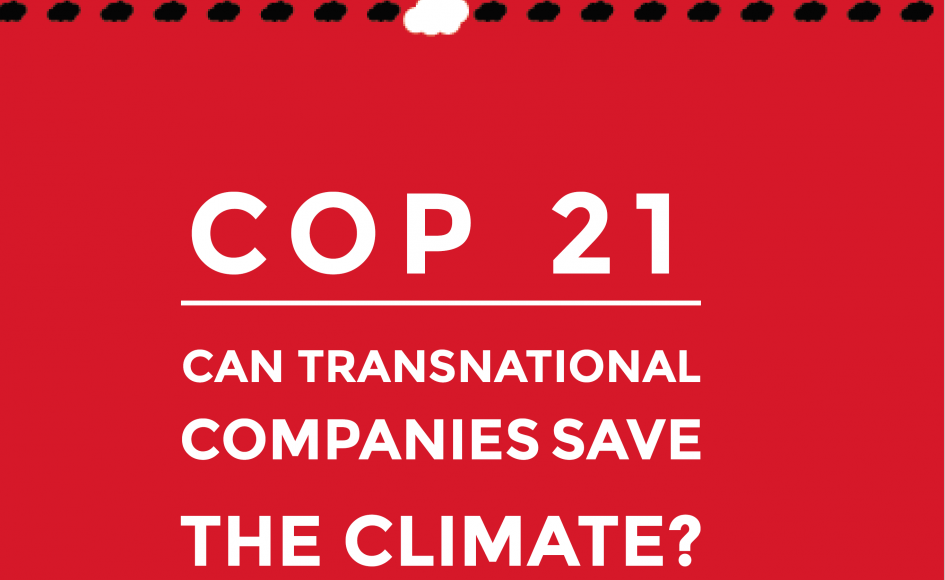On 1st December 2015, we released our report on the private sponsors of the COP 21 in partnership with the Multinational’s Observatory : “COP 21 : can transnational companies save the climate ?”
You can read here the article of the Guardian published 1st December 2015
French Corporations and COP21: beyond slogans, questionable actions and results
French corporations chose to communicate strongly about the Climate Conference currently held in Paris, but the policies they implement to concretely reduce their greenhouse gas emissions are still insufficient and partial, as demonstrated by a new report published today by BASIC and the Multinationals’ Observatory.
On November 27th, 39 French corporations released a “manifesto for the climate” where they listed their commitments that supposedly put them ahead of civil society in the global fight against climate change.
The report “COP 21 : can transnational companies save the climate ?”, which is published today brings to light a different story, based on a detailed analysis of the carbon emissions reduction policies of 10 French corporations which are among the main official sponsors of the COP21 (Accor, BNP Paribas, Carrefour, EDF, Engie, Kering, L’Oréal, LVMH, Michelin and Renault).
Only a minority of these corporations transparently and coherently measures and publishes each year its greenhouse gas emissions. Few of them assess their global carbon footprint from raw materials to products’ use. None has implemented a global and accountable strategy to reduce its carbon emissions along the whole value chain. In fact, many of them solely implement fragmented actions on a limited portion of their chains. Only one corporation, EDF, seems to be reducing its greenhouse gas emissions in line with the global objectives set by France and the European Union – partially thanks to favourable external conditions. Meanwhile, many corporations keep increasing their emissions year upon year.
“The transnational corporations we studied make undeniable efforts, but their results do not live up to the challenges, and do not match the economic power they acquired in their respective sectors.“, states Sylvain Ly from BASIC.
“French corporations, in particular EDF and Engie, over-communicate about their commitment for the climate, and the French government decided to give them a prominent role in the COP21”, adds Olivier Petitjean from the Multinationals’ Observatory. “The report realised by BASIC is one of the few attempts to take them at their word and see what concretely lies behind the rhetoric.“
Superficial reduction of greenhouse gas (GHG) emissions
More broadly, the report raises some fundamental questions about corporations’ climate strategies, and doubts on their concrete efficiency. The reduction of greenhouse gas emissions linked to their own activities often hides an outsourcing of these emissions up the value chain, notably in emerging countries. “Beyond appearances, the European Union’s carbon emissions have only slightly decreased since 1990 because we increasingly import products that generate unrecorded growing emissions”, explains Christophe Alliot from BASIC. “Similarly, assessing the greenhouse gas emissions of a corporation in isolation from the ones generated upstream and downstream would mean not seeing the wood for the trees.”
Many corporations also keep resorting to “offset mechanisms” in order to achieve “carbon neutrality” (for instance, through investments in reforestation projects), even though the real benefits of these mechanisms are increasingly questioned. To reduce carbon emissions on the long term, corporations seem to count on future “technological breakthroughs” that are still highly hypothetical (such as carbon capture and sequestration), problematical (for instance the nuclear energy) and/or still insufficient (for example the electric car).
The report concludes that none of the corporations analysed is able to provide solutions that measure up to the challenge of climate change. Neither outsourcing and offsetting, nor technological breakthroughs can replace an absolute “decoupling” of greenhouse gas emissions from economic growth, that is to say a company’s ability to sell more [products or services] while reducing GHG emissions on its whole value chain. In the absence of such decoupling, it seems rather illusive to think that transnational corporations – that provide most of our daily products and services – will give up growth, even for the sake of reducing the GHG volumes released in the atmosphere.
That is the reason why, although transnational corporations’ commitment is critical, it cannot be a substitute for public policy and regulation, which are essential to achieve the needed structural, social and economic reduction of our emissions on the short term.
The reports can be downloaded below:
Abstract in French : Abstract_FR
Abstract in English : Abstract_UK
Report (in French) without appendices : COP21_Doit-on faire confiance aux grands groupes
Report (in French) with appendices : COP21_Doit-on faire confiance aux grands groupes_FULL
—
Contacts:
Sylvain Ly, +33 (0)6 23 36 10 96, sylvain@lebasic.com and Christophe Alliot, +33 (0)6 61 64 24 49, christophe@lebasic.com;
Olivier Petitjean, +33 (0)6 08 27 39 89, opetitjean@multinationales.org


